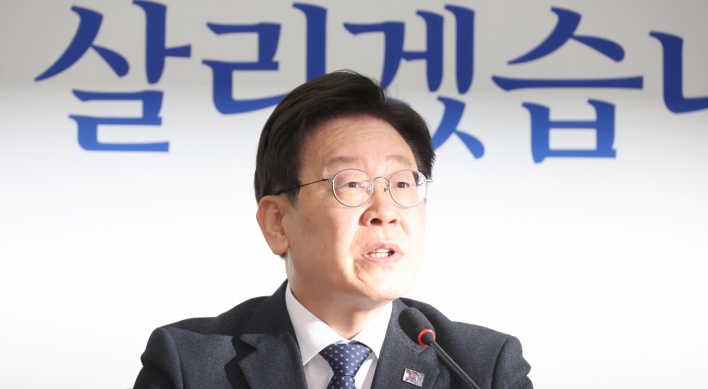Pyongyang denies any plan for nuclear test
New satellite imagery suggests that North Korea has upgraded its old rocket launch site in the northeastern town of Musudan, U.S. experts said Tuesday.
After analyzing an April 29 aerial image, the U.S.-Korea Institute at Johns Hopkins University said the communist regime has renovated a launch pad for larger, higher-capacity missiles at the place where it fired its first two long-range rockets in 2006 and 2009.
The photo shows the initial stages of construction of a launch pad and rocket assembly building.
“The new construction is intended to support future launches of rockets larger than the recently tested Unha ― more capable liquid-fueled space launch vehicles or missiles with intercontinental ranges ― that will also fly over Japan, further aggravating regional tensions,” the institute said on its blog.
The facilities may be ready for operation by 2016-2017, it added.
Separate satellite photos of Punggye also showed recent progress in mining and excavation activity for an underground detonation, according to an analysis by James Hardy, Asia Pacific specialist with IHS Jane’s, a U.S. defense information provider.
New satellite imagery suggests that North Korea has upgraded its old rocket launch site in the northeastern town of Musudan, U.S. experts said Tuesday.
After analyzing an April 29 aerial image, the U.S.-Korea Institute at Johns Hopkins University said the communist regime has renovated a launch pad for larger, higher-capacity missiles at the place where it fired its first two long-range rockets in 2006 and 2009.
The photo shows the initial stages of construction of a launch pad and rocket assembly building.
“The new construction is intended to support future launches of rockets larger than the recently tested Unha ― more capable liquid-fueled space launch vehicles or missiles with intercontinental ranges ― that will also fly over Japan, further aggravating regional tensions,” the institute said on its blog.
The facilities may be ready for operation by 2016-2017, it added.
Separate satellite photos of Punggye also showed recent progress in mining and excavation activity for an underground detonation, according to an analysis by James Hardy, Asia Pacific specialist with IHS Jane’s, a U.S. defense information provider.

The North has been expected to conduct a third nuclear test. It tested its atomic devices after similar rocket liftoffs in 2006 and 2009.
On Tuesday, North Korea said it has no plan for a nuclear test for the time being and remains open to dialogue to settle the standoff. But it pledged again to strengthen its “nuclear deterrent” and “self-defense” measures to counter U.S. hostility.
“I don’t think it adds or retracts anything in the North Korean attitude for the moment,” said Glyn Davies, U.S. special representative for North Korea policy. He was in Beijing to meet his Chinese counterpart Wu Dawei and Vice Foreign Minister Fu Ying.
On Monday, he urged North Korea not to “miscalculate” and refrain from further provocative acts.
“We’re united in our resolve to respond, not just the three allies but China and Russia as well, if there are additional provocations,” Davies told reporters after a meeting in Seoul with top nuclear envoys from South Korea and Japan, Lim Sung-nam and Shinsuke Sugiyama.
Good Friends, a Seoul-based rights group, cited an official with the North’s Workers’ Party early this month as saying that Pyongyang is readying a second rocket at its Dongchang site, where it unsuccessfully launched a rocket on April 13.
“Outsiders are making a big fuss about a third nuclear test. Strategically, we’ll concentrate their attention on Punggye-ri,” the source was quoted as saying, referring to the North’s atomic testing site in the northwest. The official did not give a time frame.
“There are a few units of long-range rockets around Dongchang-ri and a nuclear test is being prepared in Punggye-ri. There will be no nuclear test before a second rocket launch.”
The argument raised the possibility that the North intends to perfect its long-range missile capabilities.
The U.N. Security Council toughened sanctions following the April launch, which it called a breach of its ban on nuclear and missile activity. Pyongyang insists it wanted to send a civilian satellite into orbit.
The botched rocket also resulted in the breaking off of a deal between Pyongyang and Washington. The poverty-ravaged North agreed on Feb. 29 to suspend its nuclear and missile programs in return for 240,000 tons of food aid.
According to news reports, a senior U.S. official speculated to be Joseph DeTrani, director of the National Counterproliferation Center, secretly visited Pyongyang on a presidential mission a week before the April 13 launch.
State Department spokesperson Victoria Nuland declined to comment at a news briefing on Tuesday.
The Group of Eight nations urged this week the North should adhere to international norms or face more isolation.
“We urge the Democratic People’s Republic of Korea to comply with its international obligations and abandon all nuclear and ballistic missile programs in a complete, verifiable and irreversible manner,” their joint statement said.
By Shin Hyon-hee (heeshin@heraldcorp.com)



![[Herald Interview] 'Amid aging population, Korea to invite more young professionals from overseas'](http://res.heraldm.com/phpwas/restmb_idxmake.php?idx=644&simg=/content/image/2024/04/24/20240424050844_0.jpg&u=20240424200058)







![[Hello India] Hyundai Motor vows to boost 'clean mobility' in India](http://res.heraldm.com/phpwas/restmb_idxmake.php?idx=644&simg=/content/image/2024/04/25/20240425050672_0.jpg&u=)





![[Today’s K-pop] NewJeans' single teasers release amid intrigue](http://res.heraldm.com/phpwas/restmb_idxmake.php?idx=642&simg=/content/image/2024/04/26/20240426050575_0.jpg&u=)